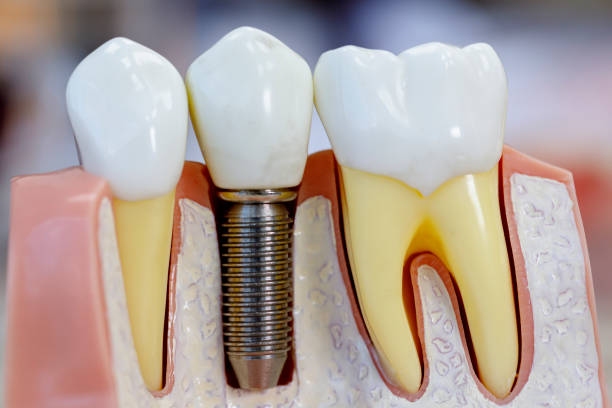These days, dental implants are all the rage when it comes to replacing missing teeth. They have a crazy high success rate of almost 98%! Not only do they last for a long time, but they also blend in so well that you won’t even be able to tell they’re not your natural teeth.
However, not all patients are suitable candidates for dental implants due to various reasons such as bone loss or medical conditions. In these cases, dentists may recommend alternative options to replace missing teeth.
At Illume Dental, we’re dedicated to bringing our patients state-of-the-art dental implant care procedures. While dental implants are a remarkable solution for when it comes to tooth replacement options, we have a wide range of innovative designs that cater to your unique needs.
Alternatives for Dental Implants
Not everyone may be up for dental implants, even though they come with a bunch of perks. It’s totally understandable if they’re not the right fit or if you simply prefer other options.
Some may prefer a less invasive option while others may not be eligible for dental implants due to health or financial reasons. In such cases, dentists may recommend alternative procedures that can provide similar results. Let’s take a closer look at the various options available.
Dentures
Dentures are like fake teeth that you can take out whenever you want. They’re great for filling in gaps left by missing teeth, whether it’s on the top or bottom. A set of dentures typically includes artificial teeth on a pinkish or gum-colored base made of either plastic or metal.
Dentures are specially made to fit comfortably over your gums, which you can take out easily when it’s time to clean them.
Types of Dentures
- Partial dentures: used when some natural teeth remain in the jaw
- Complete dentures: used when all-natural teeth have been lost
- Overdenture: a type of complete denture that is supported by dental implants
Pros of Dentures
- Less invasive compared to dental implants
- Affordable option
- Can be made quickly and easily replaced if damaged
Cons of Dentures
- Not as stable as dental implants
- Can cause difficulty with speaking and eating
- May require frequent adjustments or replacements due to natural changes in the jaw and gums
Dental Bridges
Dental bridges are like special fake teeth that fill in the gaps when you’re missing one or more teeth. They have two crowns on each side of the gap and a fake tooth in the middle. The crowns are connected to your nearby natural teeth to keep everything in place.
Types of Dental Bridges
- Traditional bridge: most common type, involves dental crowns on either side of the gap with an artificial tooth in between
- Cantilever bridge: used when there is only one natural tooth next to the gap
- Maryland bridge: a dental restoration that involves attaching a metal or porcelain framework to the neighboring teeth for support.
Pros of Dental Bridges
- More stable than dentures
- Quicker procedure than dental implants
- Can prevent natural teeth from shifting due to missing teeth
Cons of Dental Bridges
- Requires healthy adjacent teeth to be used as support
- May need to be replaced every 5-15 years
Resin-bonded Bridge
A resin-bonded bridge, also known as a Maryland bridge, is a type of dental bridge that is bonded to the back of adjacent teeth with a metal or porcelain framework. This type of bridge is commonly used for front teeth.
Pros of Resin-bonded Bridge
- Less invasive compared to traditional bridges
- Can be completed in one appointment
- More affordable option than dental implants
Cons of Resin-bonded Bridge
- Not as strong or durable as traditional bridges
- Not suitable for replacing molars or teeth with high chewing pressure
Flipper
A flipper, which is also referred to as a temporary denture, is a type of removable partial denture that serves the purpose of replacing missing teeth. It can be easily taken out and put back in as needed. It is typically made of acrylic and held in place by clasps attached to adjacent natural teeth.
Pros of Flipper
- Affordable option for replacing missing teeth
- Can be easily adjusted or repaired if damaged
Cons of Flipper
- Not as stable as bridges or implants
- May need frequent adjustments due to changes in the mouth’s shape
Implant-supported Bridge
An implant-supported bridge is a dental solution that functions similarly to a traditional bridge. However, rather than relying on neighboring natural teeth for support, it is anchored by dental implants. This option is suitable for replacing multiple missing teeth in one area.
Pros of Implant-supported Bridge
- Provides a stable and permanent solution for missing teeth
- Helps maintain jawbone density
- Can last a lifetime with proper care
Cons of Implant-supported Bridge
- More expensive than other options
- Requires a surgical procedure for implant placement
- May take longer to complete compared to other procedures
While dental implants may be the most popular and effective solution for missing teeth, there are alternative procedures available that may better suit an individual’s needs and budget.
Dentures, dental bridges, resin-bonded bridge, flipper, and implant-supported bridge all have their own advantages and disadvantages, making it important for patients to understand their options before deciding on a treatment plan.
Seek help from our pros at Illume Dental to know the best alternative to dental implant that fits your specific needs. Book an appointment with us today and let us help you achieve a healthy and confident smile.
No matter your unique dental implant needs, Illume Dental has the cutting-edge procedures and expertise to aid in the development of a more radiant grin. Contact us today to schedule a consultation and explore which of our advanced dental implant-related procedures is right for you.
